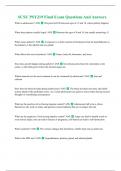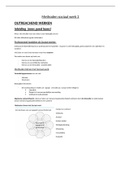SCSU PSY219 Final Exam Questions And Answers
What is adolescence? ANS The period of life between ages of 11 and 18, where puberty happens
When does puberty usually begin? ANS Between the ages of 8 and 14, but usually around age 11
What causes puberty? ANS A response to a chain reaction of hormones from the hypothalamus to
the pituitary to the adrenal and sex glands
What affects the onset of puberty? ANS Genes, body fat, hormones, and stress
How does growth happen during puberty? ANS Growth proceeds from the extremities to the
center, so the limbs grow before the internal organs do
Which minerals are the most common to not be consumed by adolescents? ANS Iron and
calcium
How does the brain develop during adolescence? ANS The brain develops unevenly; the limbic
system ahead of the prefrontal cortex. As a result adolescents are quick to react, before having second
thoughts or considering consequences
What are the positives of not having impulse control? ANS Adolescents fall in love, throw
themselves into work or study, and question social traditions that are no longer relevant
What are the negatives of not having impulse control? ANS Anger can lead to hurtful words or
even serious injury, lust can lead to disease or pregnancy, self-hatred can lead to self-destruction
What is puberty? ANS The various changes that transform a child's body into an adult one
What is the HPA axis? ANS Hypothalamus, pituitary gland, and adrenal glands
,What affects the time someone goes through puberty? ANS • Sex
• Genetic background
• Body fat
• Level of stress
What is a growth spurt? ANS An acceleration of growth in every part of the body. Peak weight
usually pasts peak height, which is then followed by peak muscle growth
What happens during puberty to an adolescent? ANS • Thinking reaches heightened self-
consciousness
• Adolescents become egocentric (they often feel invincible, unique, and the center of attention)
• Piaget's fourth and final stage (Formal Operational) begins
What is Piaget's Formal Operational stage? ANS He found that adolescents' deductive logic and
hypothetical reasoning improves
What are the two modes of cognition? ANS Intuitive thought and analytical thought
What is intuitive thinking? ANS Thoughts that arise from an emotion or hunch, beyond rational
explanation, and is influenced by past experiences and cultural assumptions
What is analytical thinking? ANS Thoughts that result from analysis, such as a systematic
ranking of pros and cons, risks and consequences, possibilities and facts; depends on logic and
rationality
What does having sex too early lead to? ANS Drug use, depression, and STIs are more common
What are the positive aspects of technology in adolescent cognition? ANS A computer is a tool
for learning, and online connections promote social outreach and reduce isolation
What are the negative aspects of technology in adolescent cognition? ANS • Cyberbullying
, • Sexting
• Video game addiction
Can interfere with education and friendship rather than enhance them
What is personal fabel? ANS The belief that one is unique, destined to have a heroic, fabled,
and/or legendary life
What is invincibility fable? ANS The idea that death will not occur unless destiny allows it, and
there for fast driving, unprotected sex, or addictive drugs will do no harm
What is imaginary audience? ANS Adolescents believe that they are at center stage and that
everyone is taking note their appearance, ideas, and behavior; making many teenagers self-conscious
What is hypothetical thought? ANS Reasoning about if-then propositions that do not reflect
reality
What is deductive reasoning? ANS Also known as top-down reasoning, reasoning from a general
statement, premise, or principle, through logical steps, to figure out specifics
What is inductive reasoning? ANS Also known as bottom-up reasoning, reasoning from one or
more specific experiences or facts to reach a general conclusion
What was Erikson's fifth psychosocial crisis? ANS Identity versus role confusion; was when
adolescence was characterized as a time to search for a personal identity in order to reach identity
achievement by adulthood
Which specific aspects of identity have taken new forms? ANS Religious, political, vocational,
and sexual
What happens when teenager's emotions are unchecked or intensified by their social contexts? ANS
More often can lead to parasuicide, minor lawbreaking and less often to completed suicide or jail.





